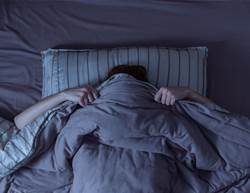We all tend to blame fatigue on a too-busy lifestyle. And much of the time we're right. But if you feel tired all the time or your always asking yourself "why am I so tired?", don't blow it off. Give yourself about two to three weeks to make some lifestyle changes: Get more sleep, trim your social calendar, eat more wholesome foods, drink more fluids, take a multivitamin, and cut back on caffeine and alcohol.
"If you're still feeling the symptoms of fatigue after those changes, then you need professional help," says Dr Sandra Adamson Fryhofer. Excess exhaustion could be the sign of a more serious medical condition that can be treated. Here are the eight most common problems you need to know about:
Anaemia
The fatigue caused by anaemia is the result of a lack of red blood cells, which bring oxygen from your lungs to your tissues and cells. You may feel weak and short of breath. Anaemia may be caused by an iron or vitamin deficiency, blood loss, internal bleeding, or a chronic disease such as rheumatoid arthritis, cancer, or kidney failure. Women of childbearing age are especially susceptible to iron-deficiency anaemia because of blood loss during menstruation and the body's need for extra iron during pregnancy and breastfeeding, explains Dr Laurence Corash.
The symptoms: Feeling tired all the time is a major one. Others include extreme weakness, difficulty sleeping, lack of concentration, rapid heartbeat, chest pains, and headache. Simple exercise, such as climbing the stairs or walking short distances, can cause fatigue.
The tests: A thorough evaluation for anaemia includes a physical exam and blood tests, including a complete blood count (CBC), to check the levels of your red blood cells. It's also standard to check the stool for blood loss.
Diabetes
More than a million people are diagnosed with type 2 diabetes every year, but many more may not even know they have it. Sugar, also called glucose, is the fuel that keeps your body going. And that means trouble for people with type 2 diabetes who can't use glucose properly, causing it to build up in the blood. Without enough energy to keep the body running smoothly, people with diabetes often notice fatigue as one of the first warning signs, says Dr Christopher D. Saudek.
The symptoms: Aside from feeling tired all the time, other signs include excessive thirst, frequent urination, hunger, weight loss, irritability, yeast infections, and blurred vision.
The tests:
Diabetes is usually tested by using a blood glucose test. Normally, a blood sample is taken from your vein and sent to a pathology lab for analysis. There are different types of blood tests. You may be asked to fast overnight beforehand (fasting blood glucose test) or you may not need to prepare. You may be asked to take an oral glucose tolerance test. For this test, you are asked to fast, have a blood sample taken, then drink a sugary drink provided for you and have another blood sample taken two hours later.
Depression
More than "the blues," depression is a major illness that affects the way we sleep, eat, and feel about ourselves and others. Without treatment, the symptoms of depression may last for weeks, months, or even years.
The symptoms: We don't all experience depression in the same way. But commonly, depression can cause decreased energy, changes in sleeping and eating patterns, problems with memory and concentration, and feelings of hopelessness, worthlessness, and negativity.
The tests: There's no blood test for depression, but your doctor may be able to identify it by asking you a series of questions. If you experience five or more of these symptoms below for more than two weeks, or if they interfere with your life, see your doctor or mental health professional: fatigue or loss of energy; sleeping too little or too much; a persistent sad, anxious, or "empty" mood; reduced appetite and weight loss; increased appetite and weight gain; loss of interest or pleasure in activities once enjoyed; restlessness or irritability; persistent physical symptoms that don't respond to treatment, such as headaches, chronic pain, or constipation and other digestive disorders.
Chronic fatigue
This baffling condition causes a strong fatigue that comes on quickly. People who suffer from CFS feel too tired to carry on with their normal activities and are easily exhausted with little exertion.
The symptoms: Other signs include headache, muscle and joint pain, weakness, tender lymph nodes, and an inability to concentrate. Chronic fatigue syndrome remains puzzling, because it has no known cause.
The tests: There is none. Your doctor must rule out other conditions with similar symptoms, such as lupus and multiple sclerosis, before making the diagnosis.
Sleep apnoea
You could have this sleep-disrupting problem if you wake up feeling tired no matter how much rest you think you got. Sleep apnoea is a disorder characterized by brief interruptions of breathing during sleep. In the most common type, obstructive sleep apnoea, your upper airway actually closes or collapses for a few seconds, which, in turn, alerts your brain to wake you up to begin breathing again.
The symptoms: Sleep apnoea is often signalled by snoring and is generally followed by tiredness the next day. Because sleep apnoea can lead to heart disease, high blood pressure, and stroke, it's important to be tested.
The test: This involves an overnight stay at a sleep clinic, where you'll undergo a polysomnogram, which is a painless test that will monitor your sleep patterns, breathing changes, and brain activity.
Narcolepsy
It's estimated that three million people around the world aren't just tired, they have narcolepsy, a disorder that disrupts your normal sleep-wake cycle and makes you feel excessively exhausted, even to the point of falling asleep mid-activity. And, many of those people will be undiagnosed.
The symptoms: Excessive daytime sleepiness, sudden episodes of muscle weakness triggered by high emotions, sleep paralysis, dream-like auditory or visual hallucinations, while dozing or falling asleep.
The tests: This involves an overnight sleep study with a multiple sleep latency test. The sleep study checks for other explanations that could account for daytime sleepiness, such as sleep deprivation, sleep apnoea and depression. The test is done in a sleep laboratory, where brain waves, eye movements, muscle activity, heartbeat, blood oxygen levels and respiration are monitored electronically with a device called a polysomnograph. The multiple sleep latency test is performed after an adequate night’s sleep has been demonstrated clearly. Usually, it is done after a sleep study.
The sleep latency test consists of four 20-minute opportunities to nap, which are offered every two hours throughout the day. Patients with narcolepsy fall asleep in approximately five minutes or less, and transition in REM sleep during at least two of the four naps. In contrast, normal subjects take an average of 12 to 14 minutes to fall asleep, and show no REM sleep.










